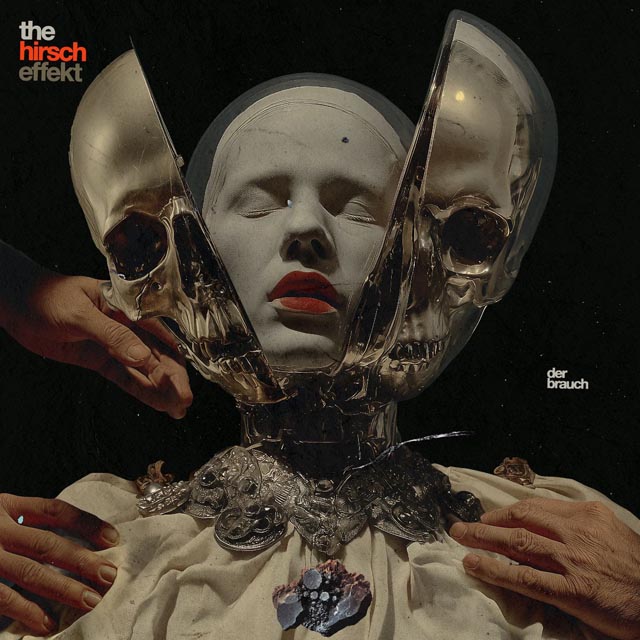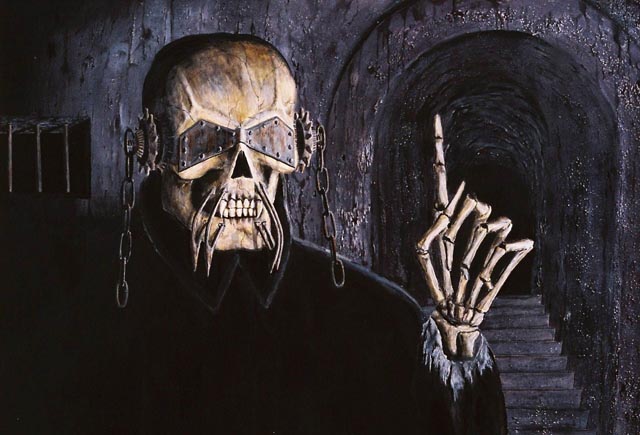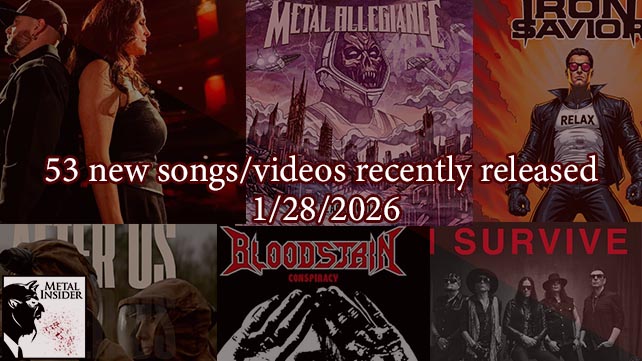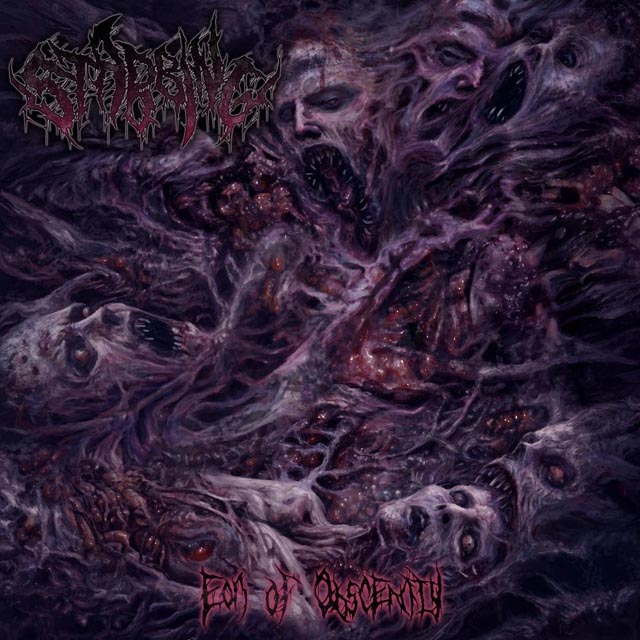IKILLYA have been making a name for themselves in New York and beyond since the release of 2011’s Recon. For their sophomore album, Vae Victis, out on April 29th, the band’s signed a distribution deal with MRI, and have undergone plenty of other changes as well. As the band’s vocalist and driving force, Jason Lekberg has applied knowledge he’s picked up working in the music industry at labels including Epic and Eleven Seven to do what’s best for his band. And as someone that’s both in a band and has seen the other side of the industry, he has a unique perspective. We spoke to him about how IKILLYA landed a distribution deal, the pros and cons of being unsigned versus being on a label and the band’s unsuccessful crowd-funding campaign,. While Vae Victis won’t be out until the end of the month, we’re proud to debut “Of the Most Magnificent” below. The album can be preordered here.
IKILLYA’s first album was released independently, but you lined up a distribution deal for Vae Victis. How did that come about?
When we finished the record, we were getting final mixes back and getting the master done. I started sending them around to different people I knew that I would be interested in working with. When we had been putting out the first record I had had very limited talks with Missi at Megaforce about it, and so I sent her the new record again and told her I’d love to talk to her if it was something she might be interested in. She came back and asked if we’d be interested in a distribution deal, which was something that was very appealing to me. My personal company was founded to help artists release their own music, so it’s exactly what I’m doing for other artists. So the ability to do it for ourselves and claim ownership of our masters and have a little more control was something that was very appealing. I wouldn’t have been upset if somebody had come in and said they wanted to spend a good amount of money on us, but I’m also really realistic about where the music industry is today and really what IKILLYA is worth. We’re a young band – we have a lot of proving to do. So I felt like it was a really good option for us for where we are right now.
Do you think a distribution deal is something that any band would be able to do that worked hard enough?
I think the music industry in general is at a place and it’s moving even more towards this place where there’s a lot more work required for the artists themselves. It’s not just about playing the music anymore, which is disappointing to all people who like to play music. But you’re really required to do a lot more work. If you are already in that headspace and you’re prepared to do a lot of work, then it could be a good solution. But a distribution deal is ultimately a really minimal amount of support from the record label that you’re streaming through with generally no money up front. So you have to fund everything yourself, you have to do everything yourself. Last week I finished a mailing to all the indie record stores and it’s 160 some different packages that I had to pack out. It doesn’t seem like a lot, but when you write a personalized note to each one, each one gets different things in it and they all have to be weighed differently, and put postage on them and taking them to the post office – it’s a huge task. If you’re willing to do that amount of work and you’re willing to sleep three hours a night, it’s definitely an option.
And I’m not taking away at all the value of record labels because they’re hugely valuable in having a team that has the right relationships, that has the expertise, that has a little bit bigger checkbook to market you and get you out there. It’s absolutely the way to go if it’s the right team. But for us I felt like – just to be real – we didn’t have that many other options on the table. We’re too small to really be worth anything. So this was an opportunity for us to make another step forward and hopefully get ourselves in front of a few more people. Maybe down the road we will do a proper deal with somebody, but right now it’s the right choice for us.
And what kept you from just doing it yourself?
Two things. One would be physical distribution, which is something that is nearly impossible without some label or entity behind you. Just the thought of contacting the thousands ofiIndie record stores in America alone and trying to convince them to take your record is just not going to happen. So that was the big thing – we really wanted to have that footprint, to have a physical distribution and just be available in those types of places where people discover music. Number two is just simply the ability to add the credibility to us. We got a lot of love on Recon that was great, but being an unsigned band there’s a lot of places and a lot of people that don’t take you seriously. It’s a little bit more difficult to get on a tour if there’s no label attached to you and there’s no one supporting you.
You did some crowd funding for the record, or at least attempted to. Can you talk about that a little bit?
Attempted to is the right word. Early on in the writing process, we had had a discussion about it. It was actually a heated debate about whether or not we should do it. I was on the other side of the argument so it’s a little tough for me to say without my pride being like ‘it wasn’t my idea!’” But it didn’t work out like we wanted it to. I honestly wasn’t surprised, I didn’t feel that we were big enough yet. We’ve got a lot of work still to do, we have to prove ourselves, and we have a lot of fans still to earn. I feel that the people that did support were just phenomenal – I thank them and it was awesome to have their support. But at the end of the day we ended up losing money on it because we had to make in super-small quantity several things that were expensive items. So it was not the best option for us and not what I’d advise smaller bands to do. We took a run at it and it was fun and I think we had a good time and I think we had a good campaign set up, but it was just not what we should have done at the time.
Do you think this might be a cautionary tale? Would you not recommend it to most bands?
I think it really needs to be a band that has a large enough following of people. The reality is, when you’re talking about direct to consumer initiatives, it’s really a small percentage of your fan base – even big big bands. When you look at the people that are actually on the mailing list, that are actually responding, that are actually interacting – it’s a percentage of the overall fan base. Just look at any Facebook page and look at the “talking about this” number versus the “like this” number. And obviously there’s a lot of algorithms and other things involved that get in the way there, but you still see that there’s only a small percentage of people that are really really actively involved. It’s kind of traditional when you do a preorder on an album when you’re a signed band that your preorders are going to be somewhere between 5 to 10% of your first week’s total. And people who are interested in going out that first week and going and buying the record, whether it’s on iTunes or physically, you’d think that maybe they’d want to save themselves the trouble and preorder it. But it’s not the case. To most people, music is something that augments their life but it is not a necessity. So if you’re a young band starting out and you’ve got a couple thousand followers on Facebook, you may sell a couple thousand albums over the life of an album. But the people that are going to be willing to put down the money up front is going to be a very small percentage of that. I think you need a certain amount of math to really be successful with that.
Let’s talk a little bit about the album itself. How does it differ from your first one?
We called the first album Recon because it was kind of our recognizance as a band. It was us figuring out who we were, it was 8 of the 9 songs that we ever wrote together. So I think it had less of a focus than what I would like an album to have. It was us saying “alright we’ve got this idea and here’s where we are, we’ve got these songs, let’s put them out and let’s see who we are.” And when it came to writing Vae Victis, Mansa Dave and I had been working together for several years at that point, so I think we had a much clearer vision of who we were and a much clearer vision of what we were doing. So I think this is a much more focused album. I think the sound is a little more defined, which I’m very happy about. On Recon there were a couple of songs with us saying “let’s stick a weird progressive part in the middle here because we’re feeling out maybe where we want to go.” Whereas with Vae Victis a lot of the songs started off writing them knowing that was going to be a part of it. The changes are a little more dramatic on songs like “Driven” and even on the title track “Vae Victis.” There’s a few things that the left turns are a little bit sharper, but I think we were able to do those because of the time we spent together and how we knew each other and were able to write a little bit better. I think it still very much sounds like an IKILLYA record, it’s just a little more focused and it’s more developed.
While you’re a relatively new band, you’re not kids. How do you find the balance of having real jobs and careers and being in a band like IKILLYA? What advice do you have for bands that find themselves in similar situations?
That’s been a big issue the last two years for this band. We haven’t really made a big deal about it – we’re a small band so it’s not like there’s a big deal to be made, but that exact issue actually caused significant changes within the band over the last year specifically. The three core members of the years which is Mansa, Dave and myself all have full time jobs. Last September, I knew that this is where I wanted to go – this is where I’ve wanted to go my whole life. So I actually resigned from my day job and launched my own company so I would have to freedom to work from wherever I have a laptop, wifi and a phone. That’s been a big change that I had to make, which obviously is a very stressful thing. Mansa and Dave unfortunately were not in the position to really make that big of a change. Most bands, if they’re on the trajectory to go from being a local band that tours regionally to a band that makes a living doing what they’re doing, reach this point where the next step is considerably higher up than the one previous. Dave and Mansa are just not in a position to do that balance anymore.
We had been touring on our vacation time and whatever days off we could, we did the UK over spring break and that’s how we were able to tour. But in order to really support this record and get this band to the next level, we need to tour regularly. Dave and Mansa and I wrote the record, and [they] have since left the band. So I’ve replaced the entire band actually with a couple of younger guys who are really hungry and are in a position to tour. So this Saturday we start our US run all the way to L.A. and back and then we’re back in New York for three days and we go to the UK for nine days and then we’re back. We’re doing a month solid right here, and we’re submitted for several other tours in the summer and the fall. It’s just a step that needs to be taken and I guess the best way to explain this is by the band called Battlecross which we’re all fans of. Their manager and I were talking a little while ago and she said that a couple years ago, the band and she all decided that if they were going to do this they had to all quit their jobs. Because it was the only way to have enough time to do what they needed to do number one, and number two if it was a do or die situation that’s the only way they’d be able to put in the amount of work. It really is all consuming – I think it’s definitely not for most bands. But I got to the point where if I’m 80 and I looked back on my life and I hadn’t done absolutely every single thing I could do to have a career as a musician, I would just want to kill myself. So, balls to the wall.
It’s frightening as hell. It’s been a tough year for me – aside from my wife, everything in my life has changed in the last year. My job, how I earn my living, all of the people I surround myself with – even my best friend and his wife moved to Finland. So it’s been a very tumultuous year but I feel like I’m on the right path and hopefully people dig the record and I get to take it further.
You’ve worked at major and independent labels. What lessons did you learn from working at them that you were able to apply positively or negatively towards IKILLYA?
I learned so much just working at Epic Records for three years and working at Eleven Seven which is an indie label, for a couple of years. The reason I got into the music industry a little over eight years ago on the professional side at least was that a) I wanted to learn as much as I could and b) I felt like if I wasn’t able to do it myself I wanted to help others. I’ve learned so much – I used to think that I understood what the music industry was about and I used to think that I knew how to do this and I had a grip on it. I would say that within two months of working at Epic I realized that I didn’t know anything. And I learned, and I think that the most important thing that I learned is that this industry is 100% about relationships. It’s a little disappointing sometimes to realize that, but it really is about being able to make that right phone call and send that right email and have that conversation. If you’re not even on that table, it’s not going any further than that. And I think that has only gotten more true the smaller the industry gets and the less money that’s out there. People don’t have the time or the bandwidth to go find something new and find someone new, they’re just trying to make sure that everyone’s breaking even.
So a lot of what I learned is how important it is to have those relationships. And what I’ve learned from the negative things changing within the industry is how important it is to really really be honest, which is something that I always wanted to be in my life anyway but it’s so important to be who you are and say what you’re going to do and do it. Even though there are many people that are not honest in the music industry as in any industry, it’s absolutely important because your reputation is really all you have. So that’s something I learned very very quickly. Another thing that I learned is just simply the nuts and bolts of how to do this – the proper steps of releasing a record, who I need to talk to, the priority level of the different areas within the music industry. Those types of things are just the day-to-day from doing the grind for years and from being fortunate enough to develop relationships with a couple of successful artists. You know being able to understand from their side and talk to them about the struggles they’re having. It’s helped me to be much more aware of where the potholes are and being able to swerve them before we get to them, which I think has been a big thing in helping me move forward.
Tell us about the song “Of the Most Magnificent,” which we’re premiering.
“Of the Most Magnificent” is actually the title of the book that my grandfather was writing when he died. My grandfather was a professional poet later in life, early in his life he was a Golden Glove winning boxer in Illinois. His family grew up during the Depression working in the coal mines and he lost his father and several brothers in coal mining related accidents, which was basically just being in a coal mine because it’s a horrible existence. And that coupled with the very religious family that I grew up in – my father was a pastor and my mother was a pastor’s daughter – so it was a lot of religion and a lot of very hard living. It was mostly about him writing about his life and where he’d been, and really had a very religious bend to it. It was really him kind of saying that God had helped him through things, and I’m a firm believer in the opposite.
I’m in no way a Satanist or anything but I really believe that many times religion can be a very good thing and it can help teach people and help give people major life lessons. But I feel like it can also be a crutch and can make people not make wise choices and they kind of fall back on something that will take care of them. So “Of the Most Magnificent” is about me singing to my family and my past and people I grew up with and saying to them ‘I don’t understand why you made these choices – I understand why you needed this support or why you needed these things, but look at the life that you’ve had. Look at what it’s brought you.’ There’s a line in it that says “creating nothing but the problems of the future or those who must endure them.” And that’s morbid and not the happiest thing ever but the end result of the song is a play on the old fable of Chicken Little. So the chorus is “and I believe the sky still falls I believe you were wrong all along, the sky still falls, yet I will be magnificent.” It’s me cathartically walking through this heritage that I kind of have and growing up in this environment and not understanding why people have chosen to not rely on themselves. But at the end saying you’re going to live my life and I’m going to help you as I can, but I’m not going to make that same mistake I’m not going to fail I’m not going to fall into that trap. In the end, it’s a positive thing for me but it’s kind of a dark story.
Musically it’s a little more straight ahead – the bridge is a lot of fun, I really really like the bridge. There’s kind of a trick that we like to do, we alternate which instrument in the band is going to carry the thread, or the rhythm and momentum of the song and the other musicians kind of go off and do something crazy and come back and join in later. So there’s a really cool part in the bridge where the double bass stays solid and everybody else jumps in and out of the time signature. But it’s kind of a cool thing that we try to put into our songs, it makes it really cool to play – hard to learn – but cool to play.
[youtube]http://youtu.be/BVc6gZSMYPc[/youtube]











